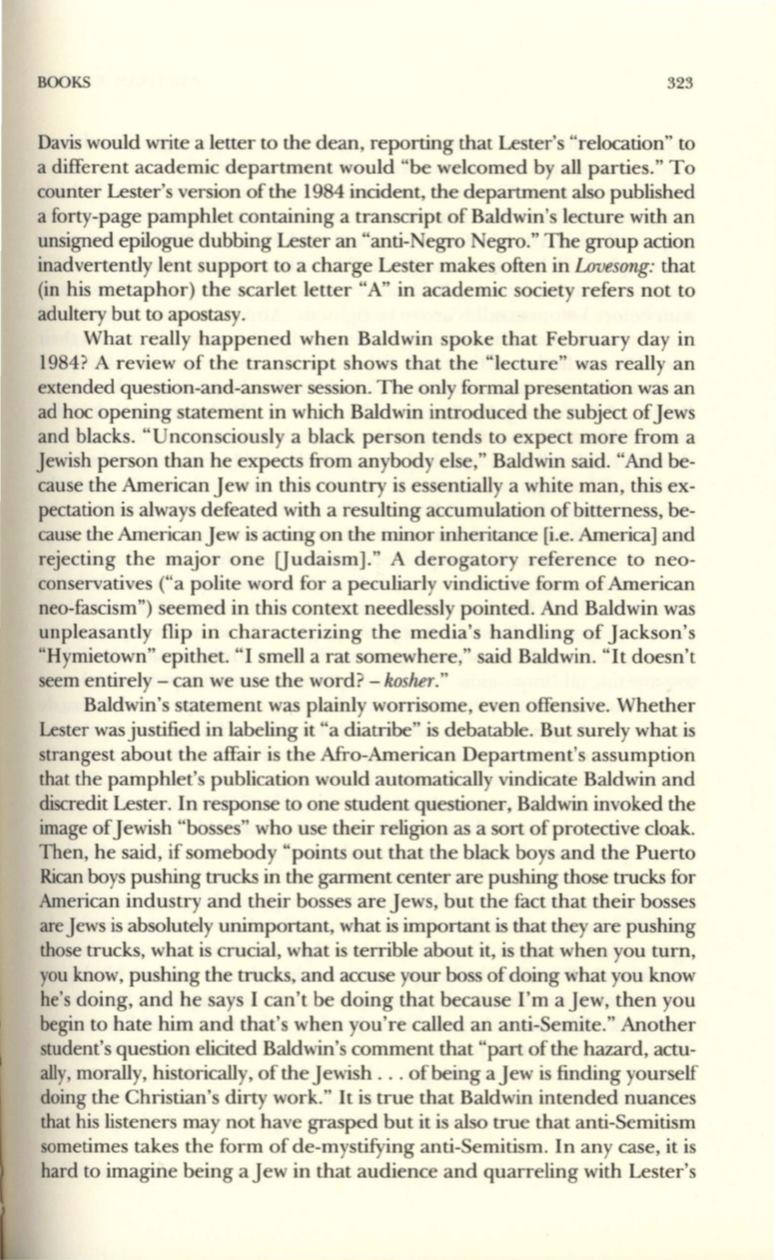
BOOKS
323
Davis would write a letter to the dean, reporting that Lester's "relocation" to
a different academic department would "be welcomed by all parties." To
counter Lester's version of the 1984 incident, the department also published
a forty-page pamphlet containing a transcript of Baldwin's lecture with an
unsigned epilogue dubbing Lester an "anti-Negro Negro." The group action
inadvertently lent support to a charge Lester makes often in
Lovesong:
that
(in his metaphor) the scarlet letter "A" in academic society refers not to
adultery but to apostasy.
What really happened when Baldwin spoke that February day in
1984? A review of the transcript shows that the "lecture" was really an
extended question-and-answer session. The only formal presentation was an
ad hoc opening statement in which Baldwin introduced the subject ofJews
and blacks. "Unconsciously a black person tends to expect more from a
Jewish person than he expects from anybody else," Baldwin said. "And be–
cause the American Jew in this country is essentially a white man, this ex–
pectation is always defeated with a resulting accumulation of bitterness, be–
cause the American Jew is acting on the minor inheritance [i.e. America] and
rejecting the major one Uudaism]." A derogatory reference to neo–
conservatives ("a polite word for a peculiarly vindictive form ofAmerican
neo-fascism") seemed in this context needlessly pointed. And Baldwin was
unpleasantly flip in characterizing the media's handling of Jackson'S
"Hymietown" epithet. "I smell a rat somewhere," said Baldwin. "It doesn't
seem entirely - can we use the word? -
kosher."
Baldwin's statement was plainly worrisome, even offensive. Whether
Lester was justified in labeling it "a diatribe" is debatable. But surely what is
strangest about the affair is the Afro-American Department's assumption
that the pamphlet's publication would automatically vindicate Baldwin and
discredit Lester. In response to one student questioner, Baldwin invoked the
image ofJewish "bosses" who use their religion as a sort of protective cloak.
Then, he said, if somebody "points out that the black boys and the Puerto
Rican
boys pushing trucks in the garment center are pushing those trucks for
American industry and their bosses are Jews, but the fact that their bosses
are Jews is absolutely unimportant, what is important is that they are pushing
those trucks, what is crucial, what is terrible about it, is that when you turn,
you know, pushing the trucks, and accuse your boss of doing what you know
he's doing, and he says I can't be doing that because I'm aJew, then you
begin to hate him and that's when you're called an anti-Semite." Another
student's question elicited Baldwin's comment that "part of the hazard, actu–
ally, morally, historically, of the Jewish ... of being a Jew is finding yourself
doing the Christian's dirty work." It is true that Baldwin intended nuances
that his listeners may not have grasped but it is also true that anti-Semitism
sometimes takes the form of de-mystifying anti-Semitism. In any case, it is
hard to imagine being aJew in that audience and quarreling with Lester's


